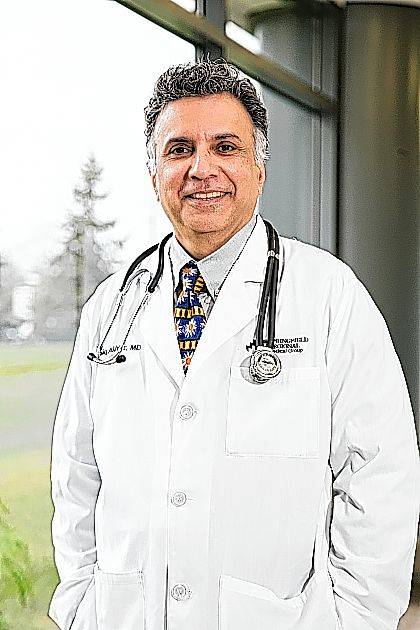
SPRINGFIELD – During February’s Heart Month observance, Mercy Health encourages you to make lifestyle changes that can you help keep from developing heart disease.
An additional 30 million Americans now have high blood pressure under new blood pressure guidelines the American College of Cardiology and the American Heart Association announced late last year. A total of 103.3 million Americans now face “the silent killer,” making lifestyle modifications to reduce high blood pressure more important than ever. Because high blood pressure can lead to heart disease, controlling it is of the utmost importance.
“The first step to controlling and lowering high blood pressure is through lifestyle changes,” said Mercy Health Physician and cardiologist Faiq Akhter, MD, cardiology section chief. “Even the smallest changes in your diet and exercise habits can reduce your risk for heart disease. Start by focusing on the risk factors that you can treat and control, such as high cholesterol, alcohol intake and tobacco use.”
Five easy steps
Below are five easy ways to lower blood pressure. However, before making any major lifestyle changes, Mercy Health recommends you first talk with your primary care doctor. If you need a primary care physician call 937-523-9699.
Weight loss is one of the most effective lifestyle changes you can make to control your blood pressure. Blood pressure often increases as your weight goes up. Being overweight can cause disrupted breathing during sleep (also known as sleep apnea), which raises blood pressure even further. Additionally, carrying too much weight around your waist (more than 40 inches for men and 35 inches for women) can put you at a greater risk. Losing just 10 pounds can help reduce your blood pressure.
Take part in regular physical activity for at least 30 minutes most days of the week. This is one of the best ways to reduce high blood pressure. However, consistency is important here. If you stop exercising, your blood pressure can rise again. Some of the best types of exercise for reducing blood pressure are walking, jogging, cycling, swimming, dancing or strength training. Consider joining a gym or taking a 30-minute walk each day.
Eat a healthy diet that’s low in sodium and includes whole grains, fruits, vegetables and low-fat dairy products to lower blood pressure. At the same time, try to cut down on saturated fats and cholesterol. For many of us, changing eating habits is easier said than done. A great way to spur positive change is to make a food diary. Start by writing down what you eat for one week to get a better picture of what you eat, how much, when and why. Additionally, aim to boost your potassium intake. Potassium can lessen the effects of sodium on blood pressure. In general, try to limit sodium to less than 2,300 mg a day. Even a small reduction in the sodium in your diet can lower your blood pressure. Be sure to read food labels when you shop and choose low-sodium alternatives and fewer processed foods. From there, avoid adding additional salt.
Limit your alcohol consumption. In small amounts, alcohol can potentially lower your blood pressure. But that protective effect is lost if you drink too much alcohol – more than one drink a day for women of any age and men older than 65 or more than two drinks a day for men 65 and younger. One drink is the equivalent of 12 ounces of beer, five ounces of wine or 1.5 ounces of 80-proof liquor. Drinking any more than these moderate amounts of alcohol can raise blood pressure by several points. It also reduces the effectiveness of blood pressure medications.
Find ways to reduce your stress. Chronic stress is a big contributor to high blood pressure. Even occasional stress can contribute to high blood pressure if you react to stress by eating unhealthy food, drinking alcohol or smoking. Examine the causes of your stress. Once you determine what’s causing your stress, you can take steps to eliminate or reduce it.
Once you start making lifestyle changes, we recommend monitoring your blood pressure at home. And while making major changes can be beneficial, it’s often just as effective to take change one small step at a time. Try just one of these easy ways to lower blood pressure, and then after you do it consistently, add in another one.
Want more tips and information? Follow Mercy Health’s blog at: https://blog.mercy.com/.


